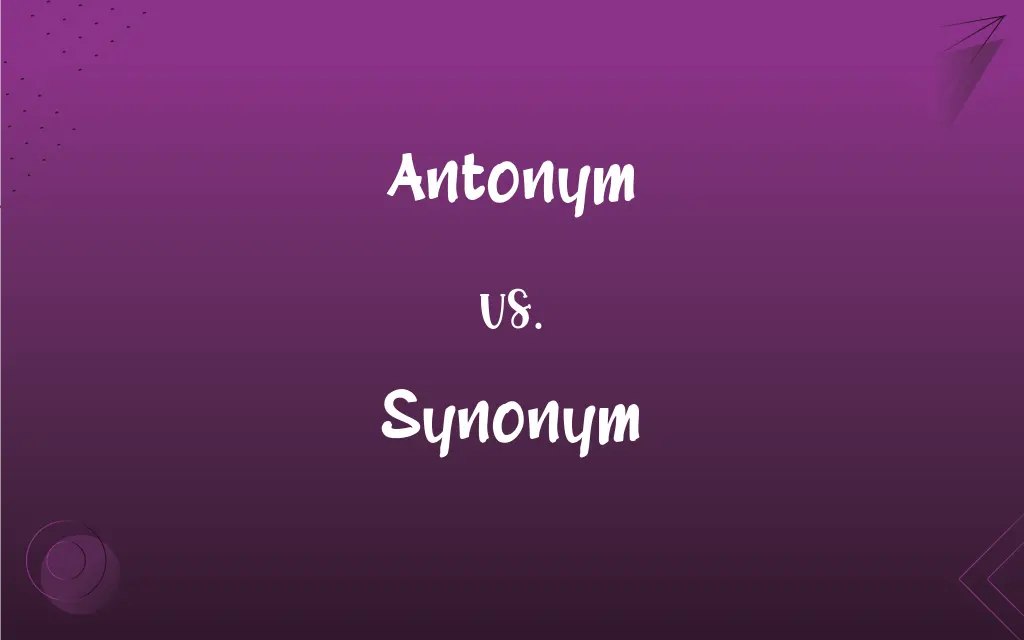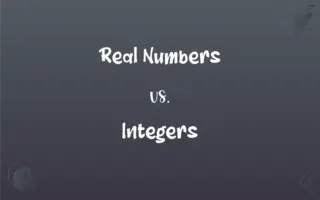Antonym vs. Synonym: What's the Difference?
Edited by Harlon Moss || By Janet White || Published on November 18, 2023
Antonyms are words with opposite meanings, while synonyms are words with similar meanings.

Key Differences
Antonyms serve to provide a clear contrast between two words, highlighting their opposing characteristics, while synonyms emphasize the shared attributes or meanings of two words.
In linguistics, antonyms help in understanding the polarity of words, such as "happy" being the antonym of "sad," whereas synonyms bring out the similarity in the language, such as "happy" being a synonym for "joyful."
It's essential to realize that while antonyms typically maintain a consistent opposite relationship, synonyms can vary in the degree of similarity, meaning some synonyms might be almost identical while others are only somewhat related.
The use of antonyms can create a stark contrast in statements, emphasizing differences, while the application of synonyms can make language richer, providing alternative ways to express the same idea.
Both antonyms and synonyms are valuable linguistic tools, with antonyms clarifying distinctions and synonyms enhancing vocabulary range and expression.
ADVERTISEMENT
Comparison Chart
Basic Definition
Words with opposite meanings
Words with similar meanings
Linguistic Role
Highlights opposing characteristics
Emphasizes shared attributes or meanings
Example Pair
"Hot" and "Cold"
"Big" and "Large"
Degree of Relationship
Typically consistent opposites
Varying degrees of similarity
Usage in Sentences
Creates contrasts
Provides alternative expressions of same idea
ADVERTISEMENT
Antonym and Synonym Definitions
Antonym
A linguistic unit counter to another.
Win is the antonym of lose.
Synonym
A descriptor mirroring another's essence.
Smart is a synonym for intelligent.
Antonym
A descriptor negating another's essence.
High is an antonym of low.
Synonym
A word with a meaning similar to another word.
Fast is a synonym for quick.
Antonym
A vocabulary word expressing inversion.
Rich is an antonym of poor.
Synonym
A linguistic substitute with equivalent sense.
End is a synonym for terminate.
Antonym
A word opposite in meaning to another.
Old is an antonym of young.
Synonym
A vocabulary word reflecting akin ideas.
Shut is a synonym for close.
Antonym
A term that denotes contrasting concepts.
Empty is an antonym of full.
Synonym
A word having the same or nearly the same meaning as another word or other words in a language.
Antonym
A word having a meaning opposite to that of another word
The word "wet" is an antonym of the word "dry.".
Synonym
A word or expression that serves as a figurative or symbolic substitute for another
"Romeo has become a synonym for any youthful lover" (Harry Levin).
Antonym
(semantics) A word which has the opposite meaning of another word.
“rich” is an antonym of “poor”; “full” is an antonym of “empty”
Synonym
(Biology) One of two or more scientific names that have been applied to the same species or other taxonomic group.
Antonym
A word that describes one end of a scale, while its opposite describes the other end, such as large versus small; a gradable antonym.
Synonym
A word whose meaning is the same as that of another word.
Antonym
A word of opposite meaning; a counterterm; - used as a correlative of synonym.
Synonym
A word or phrase with a meaning that is the same as, or very similar to, another word or phrase.
“Happy” is a synonym of “glad”.
Antonym
Two words that express opposing concepts;
To him the opposite of gay was depressed
Synonym
(zoology) Any of the formal names for a taxon, including the valid name (i.e. the senior synonym).
Synonym
Any name for a taxon, usually a validly published, formally accepted one, but often also an unpublished name.
Synonym
(databases) An alternative (often shorter) name defined for an object in a database.
Synonym
One of two or more words (commonly words of the same language) which are equivalents of each other; one of two or more words which have very nearly the same signification, and therefore may often be used interchangeably. See under Synonymous.
All languages tend to clear themselves of synonyms as intellectual culture advances, the superfluous words being taken up and appropriated by new shades and combinations of thought evolved in the progress of society.
His name has thus become, throughout all civilized countries, a synonym for probity and philanthropy.
In popular literary acceptation, and as employed in special dictionaries of such words, synonyms are words sufficiently alike in general signification to be liable to be confounded, but yet so different in special definition as to require to be distinguished.
Synonym
An incorrect or incorrectly applied scientific name, as a new name applied to a species or genus already properly named, or a specific name preoccupied by that of another species of the same genus; - so used in the system of nomenclature (which see) in which the correct scientific names of certain natural groups (usually genera, species, and subspecies) are regarded as determined by priority.
Synonym
One of two or more words corresponding in meaning but of different languages; a heteronym.
Synonym
Two words that can be interchanged in a context are said to be synonymous relative to that context
Synonym
A term that conveys a like concept.
Finish is a synonym for conclude.
FAQs
Are synonyms always interchangeable in sentences?
Not always. Context matters, and some synonyms might not fit in certain sentence structures.
Do synonyms always have the exact same meanings?
No, they have similar meanings but can differ in nuances.
What's the main distinction between an antonym and a synonym?
An antonym has an opposite meaning, while a synonym has a similar meaning.
Why are synonyms useful in writing?
Synonyms allow writers to vary language and avoid repetitiveness.
Can a word have multiple antonyms or synonyms?
Yes, many words can have several antonyms and synonyms.
How do antonyms aid in vocabulary development?
Recognizing antonyms helps learners understand word opposites and expand their word range.
Why are antonyms important in language?
Antonyms help define the boundaries of word meanings by providing contrasts.
Can antonyms be phrases, not just words?
Yes, phrases can also function as antonyms, like "give up" is the antonym of "persevere."
Is there a tool to find synonyms?
Yes, a thesaurus is a tool that provides synonyms (and sometimes antonyms) for words.
Can words evolve to have new synonyms over time?
Yes, as language evolves, words can gain new synonyms.
Why might two words be antonyms in one culture but not in another?
Language is influenced by culture, and what's considered opposite in one culture might not be in another.
What's a graded antonym?
Graded antonyms have intermediate steps, like "hot," "warm," and "cold."
Can antonyms and synonyms help in learning a new language?
Yes, understanding them can provide insight into the structure and vocabulary of a new language.
Can the same word be both an antonym and a synonym in different contexts?
Yes, depending on context, a word can be a synonym in one situation and an antonym in another.
Can a synonym affect the tone of a sentence?
Absolutely, synonyms might carry different connotations, affecting the sentence's tone.
Are synonyms used more in prose or poetry?
Both use them, but poetry might use synonyms more for stylistic and rhythmic reasons.
How are synonyms helpful in poetry?
Synonyms allow poets to choose words that fit rhythmic and rhyme patterns while conveying the desired meaning.
Why don't antonyms for certain words exist?
Not all concepts have clear opposites, so not every word will have an antonym.
Are antonyms always clear-cut opposites?
Most are, but some might have subtle differences or be context-dependent.
Is it possible for a word's antonym today to become its synonym in the future?
While rare, language evolution can lead to shifts in meaning over time.
About Author
Written by
Janet WhiteJanet White has been an esteemed writer and blogger for Difference Wiki. Holding a Master's degree in Science and Medical Journalism from the prestigious Boston University, she has consistently demonstrated her expertise and passion for her field. When she's not immersed in her work, Janet relishes her time exercising, delving into a good book, and cherishing moments with friends and family.
Edited by
Harlon MossHarlon is a seasoned quality moderator and accomplished content writer for Difference Wiki. An alumnus of the prestigious University of California, he earned his degree in Computer Science. Leveraging his academic background, Harlon brings a meticulous and informed perspective to his work, ensuring content accuracy and excellence.






































































